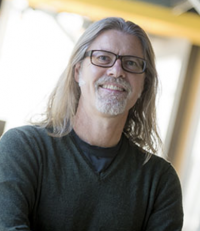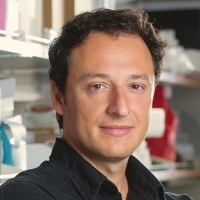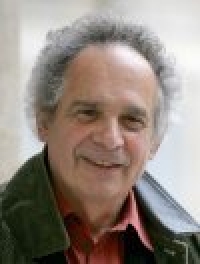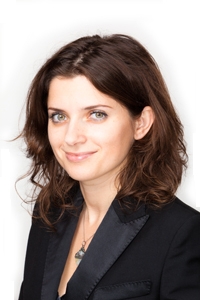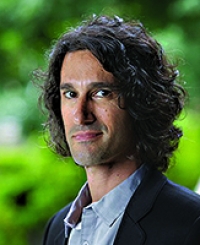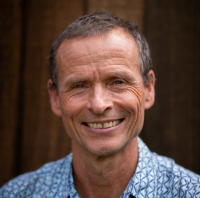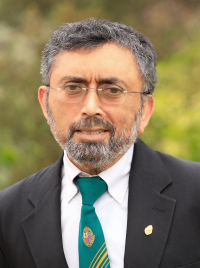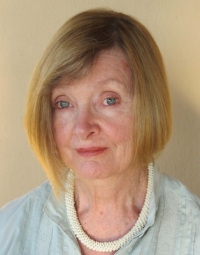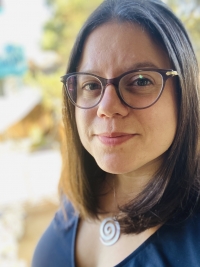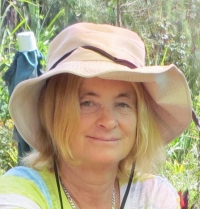Imagination and Human Origins
Biographical Sketches: Co-Chairs
Community Member
Sheldon Brown combines computer science research with vanguard cultural production. He held the John D. and Catherine T. MacArthur Foundation Endowed Chair of Digital Media and Learning at UCSD, and was the founding Director of the Arthur C. Clarke Center for Human Imagination, where he was a Professor of Visual Arts and a co-founder of the California Institute of Telecommunications and Information Technologies (Calit2), and was also the UCSD Site Director of the NSF supported Industry-University Collaborative Research Center for Hybrid Multicore Productivity Research (CHMPR). His interactive artworks have been exhibited at: The Museum of Contemporary Art in Shanghai, The Exploratorium in San Francisco, Ars Electronica in Linz Austria, The Kitchen in NYC, Zacheta Gallery in Warsaw, Centro Nacional in Mexico City, Oi Futuro in Rio de Janeiro, Museum of Contemporary Art San Diego, and others. He has also been featured at leading edge techno-culture conferences such as Supercomputing, SIGGRAPH, TedX, GDC. He has been commissioned for public artworks in Seattle, San Francisco, San Diego and Mexico City, and has received grants from the NSF, AT&T New Experiments in Art and Technology, the NEA, IBM, Intel, Sun Microsystems, SEGA SAMMY, Sony, Vicon and others.
UC San Diego
Dr Muotri is a Professor at the Departments of Pediatrics and Cellular & Molecular Medicine at UC San Diego and an Associate Director of CARTA, in addition to being the Director of the Stem Cell Program and of the Archealization Center at UC San Diego. Dr Muotri earned a BSc in Biological Sciences from the State University of Campinas in 1995 and a Ph.D. in Genetics in 2001 from the University of Sao Paulo, in Brazil. He moved to the Salk Institute as Pew Latin America Fellow in 2002 for postdoctoral training in the fields of neuroscience and stem cell biology. His research focuses on brain evolution and modelling neurological diseases using human-induced pluripotent stem cells and brain organoids. He has received several awards, including the prestigious NIH Director’s New Innovator Award, NARSAD, Emerald Foundation Young Investigator Award, Surugadai Award, Rock Star of Innovation, NIH EUREKA Award, and two Telly Awards for Excellence in Science Communication among several others.
Biographical Sketches: Speakers
The London School of Economics and Political Science
Maurice Bloch is a Franco-British anthropologist with an interest in cognitive psychology. He is a Professor at the London School of Economics and Political Science and a fellow of the British Academy. He was European Professor at the College de France in 2006. He has taught and lectured in many countries including the USA. His earliest book, Placing the Dead (Berkeley Square House, 1971) concerned Madagascar. His most recent book is Anthropology and the Cognitive Challenge (Cambridge University Press, 2014). At present, he is preparing a book on the topic of this CARTA conference.
UC San Diego
Lera Boroditsky is an Associate Professor of Cognitive Science at UCSD and Editor in Chief of Frontiers in Cultural Psychology. She previously served on the faculty at MIT and at Stanford. Her research is on the relationships between mind, world, and language (or how humans get so smart).
She has been named one of 25 Visionaries changing the world by the Utne Reader, and is also a Searle Scholar, a McDonnell scholar, recipient of an NSF Career award, and an APA Distinguished Scientist lecturer. She once used the Indonesian exclusive "we" correctly before breakfast, and was proud of herself about it all day.
Princeton University
Agustín Fuentes, trained in Zoology and Anthropology, is the Edmund P. Joyce C.S.C. Professor of Anthropology at the University of Notre Dame. His research delves into the how and why of being human. Ranging from chasing monkeys in jungles and cities, to exploring the lives of our evolutionary ancestors, to examining what people actually do across the globe, Professor Fuentes is interested in both the big questions and the small details of what makes humans and our closest relatives tick. He has published more than 150 peer reviewed articles and chapters, authored or edited 19 books and a three-volume encyclopedia, and conducted research across four continents and two-million years of human history. His current explorations include the roles of creativity and imagination in human evolution, multispecies anthropology, evolutionary theory, and the structures of race and racism. Fuentes is an active public scientist, a well-known blogger and lecturer, and a writer and explore for National Geographic. Fuentes’ recent books include “Race, Monogamy, and other lies they told you: busting myths about human nature” (U of California), “Conversations on Human Nature(s)” (Routledge) and “The Creative Spark: how imagination made humans exceptional" (Dutton).
UC San Diego
Pascal Gagneux is CARTA's Executive Co-Director, a Professor of Pathology and Anthropology, and the Department Chair of Anthropology at UC San Diego. He is interested in the evolutionary mechanisms responsible for generating and maintaining primate molecular diversity. The Gagneux laboratory studies cell-surface molecules in closely related primates species. His focus is on glycans, the oligosaccharides attached to glycolipids and glycoproteins of the surfaces of every cell and also secreted into the extra-cellular matrix. Gagneux's laboratory is exploring the roles of molecular diversity in protecting populations from pathogens as well as potential consequences for reproductive compatibility. Dr. Gagneux’s interest is in how glycan evolution is shaped by constraints from endogenous biochemistry and exogenous, pathogen-mediated natural selection, but could also have consequences for sexual selection. Dr. Gagneux has studied the behavioral ecology of wild chimpanzees in the Taï Forest, Ivory Coast, population genetics of West African chimpanzees, and differences in sialic acid biology between humans and great apes with special consideration of their differing pathogen regimes. In 2011, while Associate Director of CARTA, Dr. Gagneux helped to establish a graduate specialization in Anthropogeny at UC San Diego. This wholly unique graduate specialization is offered through eight participating graduate programs in the social and natural sciences at UC San Diego.
Kennis & Kennis Reconstructions
Kennis & Kennis Reconstructions
UC San Diego School of Medicine
Ajit Varki is a Distinguished Professor of Medicine and Cellular & Molecular Medicine, Emeritus Co-Director of CARTA, Emeritus Co-Director of the Glycobiology Research and Training Center at UC San Diego, and Adjunct Professor at the Salk Institute. He received basic training in physiology, medicine, biology, and biochemistry at the Christian Medical College (CMC), Vellore, The University of Nebraska, and Washington University in St. Louis. He also has formal training and board certification in internal medicine, hematology, and oncology. Varki is the executive editor of Essentials of Glycobiology (Cold Spring Harbor Press, 4th Edition, 2022) and is recipient of a MERIT award from the NIH, and an American Cancer Society Faculty Research Award. Honorific elections include the American Academy of Arts and Sciences, the National Academy of Medicine, the American Society for Clinical Investigation, and the Association of American Physicians. He is also recipient of the three highest honors in his field, the Karl Meyer Award of the Society for Glycobiology, the International Glycoconjugate Organization Award and the Rosalind Kornfeld Award for Lifetime Achievement in Glycobiology. He is recognized for creating the first major open access research journal (J. Clin. Invest., 1996) as well as the first major open access textbook (Essentials of Glycobiology, 2009). He was honored with the Old Cottonian of Eminence Award at the 150th Anniversary of Bishop Cotton Boys School, Bangalore, India, (2015) as well as a Distinguished Faculty Medal and Oration at his medical school alma mater, CMC, Vellore. Significant past appointments include: Co-Head, UC San Diego Division of Hematology-Oncology; President of the Society for Glycobiology; Editor-in-Chief of the Journal of Clinical Investigation; Interim Director of the UC San Diego Cancer Center, President of the American Society for Clinical Investigation, and UC San Diego Associate Dean for Physician-Scientist Training. Varki's research interests are focused on a family of cell surface sugars called sialic acids, and their roles in biology, evolution and disease. Currently, active projects are relevant to the roles of sialic acids in microbial infectivity, the regulation of the immune response, the progression and spread of tumors, aging, and unique aspects of human evolution. His group is particularly intrigued to find multiple interrelated differences in sialic acid biology between humans and our closest evolutionary cousins, the "great apes." These differences are a signature of the events that occurred during the last few million years of human evolution, and appear to be relevant to understanding several aspects of the current human condition, both in health and disease. Varki’s book, Denial (Twelve, Hachette Books, 2013), explores a novel "Mind Over Reality Transition” (MORT) theory that denying reality and personal mortality was a key step in allowing the emergence of a full theory of mind, and in the origin of our species.
University of the Witwatersrand
Lyn Wadley is a Professor based in the Evolutionary Studies Institute at the University of the Witwatersrand (South Africa) where she specializes in Middle Stone Age cognitive archaeology. She is an A1-rated National Research Foundation researcher and recipient of some of South Africa’s top research awards. In 2014 and 2015, she was on the Thomson-Reuters High Citation list that records the top 1% of researchers globally. Her research into cognitive archaeology provides theory and methods for demonstrating that some Stone Age technologies can be proxies for complex brain power. She has excavated three important Middle Stone Age archaeological sites: Rose Cottage Cave in the eastern Free State and Sibudu and Border Caves in KwaZulu-Natal.
UC San Diego
Dr. Caren Walker is an Assistant Professor of Psychology at the University of California San Diego, and director of the Early Learning & Cognition Laboratory. She received her Ph.D. in Psychology from the University of California, Berkeley in 2015. Dr. Walker’s research is in the area of cognitive development, examining the various learning mechanisms that underlie knowledge acquisition and change. This work addresses basic questions about the nature of mental representations in human cognition, and she is particularly interested in the early development of abstract thought.
Arizona State University & University of Utah
Polly Wiessner is a Professor of Anthropology at Arizona State University and the University of Utah. Over the past forty years, she has conducted ongoing research among the !Kung (Ju/'hoansi) Bushmen of the Kalahari Desert on social networks, demography, economy and firelit stories. For the past thirty-four years, she has carried out ethnohistorical studies of oral traditions among the Enga of highland Papua New Guinea (PNG), tracing developments in warfare, ritual, conflict resolution and exchange over the past 400 years. She is currently studying the breakdown of traditional cultural institutions with the introduction of new technology, modern myths and how the Enga are applying restorative justice based to rebuild communities and maintain harmony through restorative justice.
